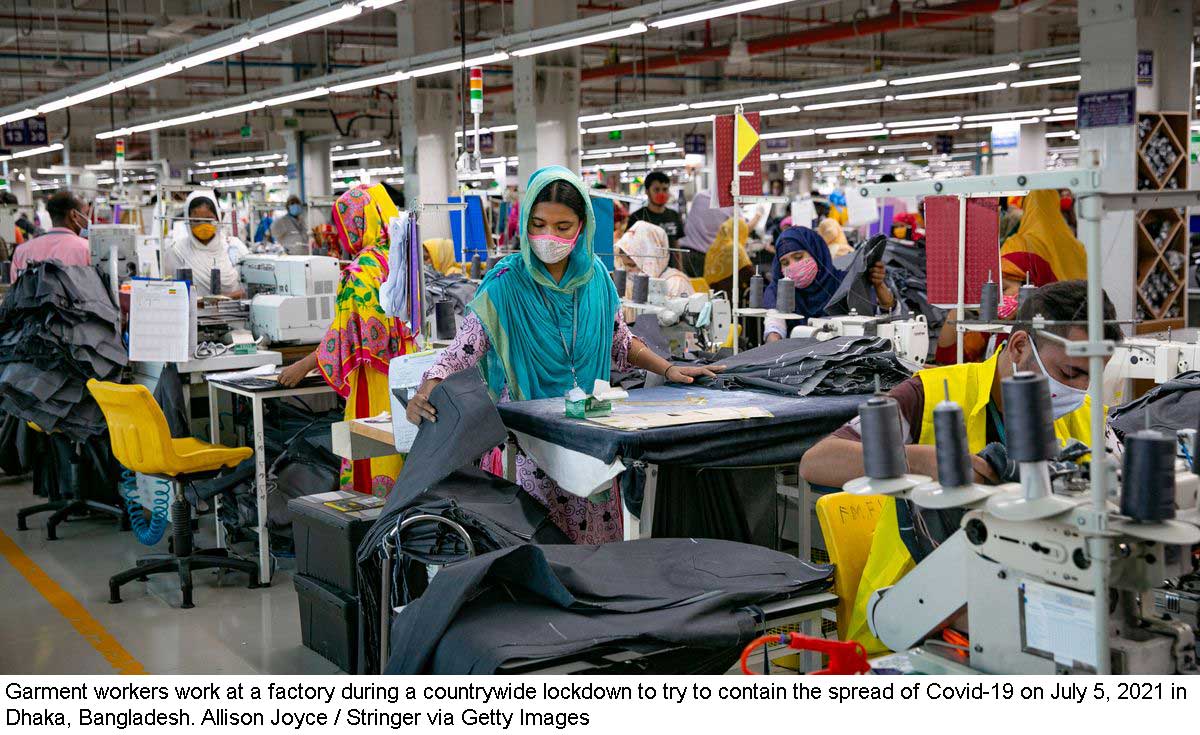
Category: GARMENTS
Country: Bangladesh
Region: Asia
When suppliers are squeezed on price, workers feel the greatest pain, writes a program manager at the NYU Stern Center for Business and Human Rights.
Published May 15, 2023
By Natasja Sheriff Wells
Bangladesh became a symbol of the dangers of outsourced clothing manufacturing when the eight-story Rana Plaza factory collapsed there in April 2013, killing more than 1,100 people. Although brands and retailers have taken steps to enhance safety since then, workers continue to bear the brunt of exploitative business practices employed by the same large companies.
During the COVID-19 pandemic, Urban Outfitters, Kohl’s, JCPenney and other major apparel brands canceled billions of dollars of orders from their suppliers in countries like Bangladesh, Vietnam, and Cambodia. In some cases, they refused to pay for goods under production or even for those they had already received. The impact on mostly poor garment workers was catastrophic: Millions were furloughed or had their pay reduced.
Following a public backlash, many companies reinstated orders and paid for goods. But some of the exploitative purchasing practices persisted and, in some cases, became more insidious and extreme.
In interviews with the NYU Stern Center for Business and Human Rights last fall and winter, representatives of 28 Bangladesh garment manufacturers told us that, instead of improving their behavior, many brands and retailers had retained practices that impinged on factory owners’ revenue and led them to cut worker hours and some benefits.
Corporate buyers are demanding deeper discounts on orders, sometimes after goods are in stores. They are withholding payment for months, forcing suppliers into debt and threatening their ability to pay workers. Deferring delivery has become common, leaving manufacturers burdened with the cost of warehousing finished items and borrowing money at steep interest rates to pay for raw materials. Suppliers in Bangladesh spoke to us anonymously because of their fear of jeopardizing relationships with major brands and retailers.
Vendors told us that their corporate customers have turned to them to offset losses they incurred as a result of pandemic-era currency fluctuations and increased shipping costs, as well as the instability caused by Russia’s invasion of Ukraine. Factory owners said they accepted unfavorable terms to avoid losing important contracts. “Every factory is hungry for orders,” one supplier told us. “If I’m not going to accept, some other factory is going to accept.”
When manufacturers are squeezed on price, workers feel the greatest pain. Already earning wages that can barely sustain them and their families, their pay or their jobs are often the first to be cut when financial pressure threatens their employer’s business. As a result of the 2020 order cancellations and non-payment for goods, workers separately told us they received less than minimum wage in the early months of the pandemic.
In Bangladesh, the current legal monthly minimum wage is 8,000 taka, or $75 dollars, an amount workers said is almost impossible to live on. One study found that a fifth of the 1,000 Bangladesh suppliers who had been surveyed struggled to pay minimum wages between March 2020 and December 2021, yet buyers had not increased their prices during that time, despite rising costs of raw materials.
What can apparel companies do?
After Rana Plaza, European and American corporate buyers formed collaborative organizations that paid for inspections of thousands of factories. They also oversaw improvements in structural and fire safety, which were paid for by factory owners. As a result, workplace safety has improved for millions of garment workers over the past decade, and a similar initiative has been created to extend beyond Bangladesh.
But factory safety requires sustained maintenance and upgrades. If suppliers are barely covering production costs and struggling to pay workers a decent wage, the cost of investing in factory safety becomes prohibitive. Purchasing practices have a crucial, if indirect, impact on worker safety and well-being.
As we mark the tenth anniversary of the Rana Plaza disaster, apparel companies can and should take action to reform damaging purchasing practices. First, they need to end unreasonable price reductions and discounts that can force suppliers to produce goods below the cost of production. Corporate buyers also should commit to fair payment timelines, taking into account the financial risk that suppliers incur before orders are even placed and, ideally, put down a deposit to share financial liability if an order is changed or canceled.
Second, brands and retailers should commit to paying prices that support an adjustment in the minimum wage in Bangladesh. Research has shown that downward price pressure by brands and retailers has failed to account for previous increases in the minimum wage. This is particularly pressing as the Bangladesh wage board — comprising representatives of industry, labor and government — begins a new round of wage negotiations this year.
Third, global clothing companies should seek to build genuinely collaborative relationships with their supplier partners. At present, these relationships are characterized by the power and leverage that international apparel companies wield. In a telling statistic, a recent report by the University of Aberdeen in Scotland found that, among 1,000 suppliers, not a single one had taken legal action against a buyer for their bad practices during the pandemic.
Corporate buyers may incur some additional costs if they take human rights into account alongside profit maximization. But as we remember the lives lost or forever changed 10 years ago, it’s clear that companies claiming to respect the interests of the workers who stitch together the products they sell must make meaningful changes.
Natasja Sheriff Wells is a senior program manager at the NYU Stern Center for Business and Human Rights. Opinions are the author’s own.
Courtesy: Supplychaindive.com
Copyrights © 2025 GLOBAL TEXTILE SOURCE. All rights reserved.